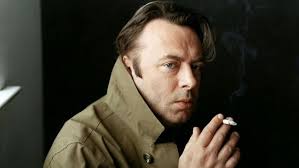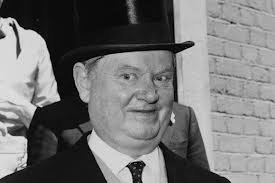I am forever indebted to a man whose ideologies and doctrines I abhor, but whose very style in demonstrating such believes captured my fullest attention. The man, polemicist, contrarian, atheist and writer is none other than Christopher Hitchens. Although an avid reader of Hitchens’s own writings, his allusion to other writers became my focal point of interest in him. Hitchens’s best seller Arguably contains chapters in which his writerly influences become subject to his sharp-witted criticism.
Christopher wastes no time, ink or paper in getting his point across and begins his berating of Evelyn Waugh with titling his essay on him ‘The Permanent Adolescent’. A specific section of George Orwell’s review of Brideshead Revisited opens the essay, including thoughts on what it means to be a Catholic. Although a review of a novel, Orwell (who admired Waugh) could not resist the temptation of questioning the effect Catholicism has on a writer’s ability in composing fiction: “One cannot really be Catholic and grown up … Waugh is about as good a novelist as one can be while holding untenable opinions.” Orwell’s thoughts on Waugh conveniently tie in with those of Hitchens and become the basis of the essay’s narrative. Reading this essay prompted me to begin reading Waugh, a revelation into English eloquence that has absorbed much of my attention in the last two years.
To enjoy an author’s writing whilst disliking the author seems ambiguous to many, but such madness becomes a necessary paradox. Hitchens enjoyed reading Waugh for the same reason I enjoy reading Hitchens – turn of phrase, the comparable cause. In Penguin’s publication of Decline and Fall, the introductory notes include a quote that fastened my interest in Waugh. He said of his work: “I regard writing not as investigation of character but as an exercise in the use of language, and with this I am obsessed”. This shared enthusiasm led to a further investigation of mine into the life of Waugh and the findings are as interesting as his writings.
Most people will agree that Evelyn is categorically a girl’s name, and each time it was mentioned to friends or family I waited for them to ask what sort of literature ‘she’ wrote so as to correct their erroneous assumption. A little while later I was to learn that his name is pronounced ‘eve, like Christmas eve’ and not ‘ev’, important to know when advocating how terrific his novels are. Exploring Waugh’s life led me to take great interest in his view of the world. Waugh was an anti-modernist writer in the modernist period, writing against the grain while simultaneously exploiting various modernist techniques. He was a traditionalist, conservative and complete snob who feared the ‘age of the common man’. Disenchanted with having been born into a middle-class family, Waugh hoped to inhabit the lifestyle of the upper class, a pursuit that led to his unpopularity among contemporaries. Relentless in his veneration of the aristocracy and his conversion to Catholicism meant Waugh fell out of touch with the world around him, and so recreated a past world in some of his fiction.
Waugh’s writing is generally divided into two sections. His earlier works which include Decline and Fall, Scoop, Vile Bodies, A Handful of Dust and many more; these novels are satirical and were received favourably by critics and readers alike. Phase two include Waugh’s works after his conversion to Catholicism, while Brideshead Revisited is seen as the dividing line between the two periods. Waugh was received into the Catholic Church in September 1930, an event promulgated as a national scandal in newspapers. The headline of the Express newspaper was as follows: “Another Author Turns To Rome, Mr. Evelyn Waugh Leaves Church Of England, Young Satirist Of Mayfair”. Writing fiction is no easy task but writing fiction while aligning yourself with the Catholic Church can be a gruelling undertaking. Catholicism seemed to harden Waugh’s outlook of the world, an attitude which was to become, in his readers’ eyes, a negative influence on his writing. A traditionalist since his younger days, Waugh developed a sense of dogmatism his readers found superfluous to the point of repugnant.
Although Waugh’s works continued to be widely read, he, like countless other writers, found himself under financial duress in later years. Due to his financial difficulties, Waugh agreed to an interview by John Freeman as part of the BBC television series Face to Face. After watching the interview, which took place six years before his death in 1960, I was overcome with a mixture of melancholia and frustration. To give some context to the interview will help elucidate the reasons for my annoyance. Waugh was a considerably private man who partook in very few interviews throughout his life. Probably the most irritating aspect of the video, which can be viewed on YouTube, is the fact the interviewer is someone who tells the public that he is a great admirer of Waugh but nonetheless interviews him in a most demeaning and disparaging manner. Instead of allowing Waugh to answer the questions posed to him in such a way that the question can be answered in its entirety, Freeman boorishly interrupts Waugh by skipping to another question. This badgering is handled by Waugh in a truly courteous manner; however, it’s quite obvious he is perplexed at the lack of decorum showed by Freeman. The interviewer is targeting Waugh for being a Christian and a Catholic in particular, a disappointing condemnation because Waugh was invited to take part in the interview so as to discuss his life and novels, not to defend his ideologies and religious affiliations. However, apart from the ridiculous behaviour of the interviewer, Waugh’s command of the English language is truly remarkable. The eloquence and lucidity in which Waugh speaks is almost lyrical and it becomes apparent why his prose is packed full of delectable turns of phrase. Hundreds of years of English elegance appear to have refined itself in Waugh to fashion a truly unique model of neo-English elitism, a snootiness not vastly appreciated by his contemporaries. Leaving to one side Waugh’s elitist haughtiness, I strongly recommend anyone with an interest in how the English language should be articulated to go and read an Evelyn Waugh novel. Mark my words, you will be captivated hook, line and sinker by this truly remarkably author.
Works Cited
Berberich, Christine. The Image of the English Gentleman in Twentieth-century Literature: Englishness and Nostalgia. Surrey: Ashgate Publishing , 2007. Book.
Hendrix, Jenny. “The Lost, Unlovable Evelyn Waugh.” The Slate Book Review (2012): 1. web.

